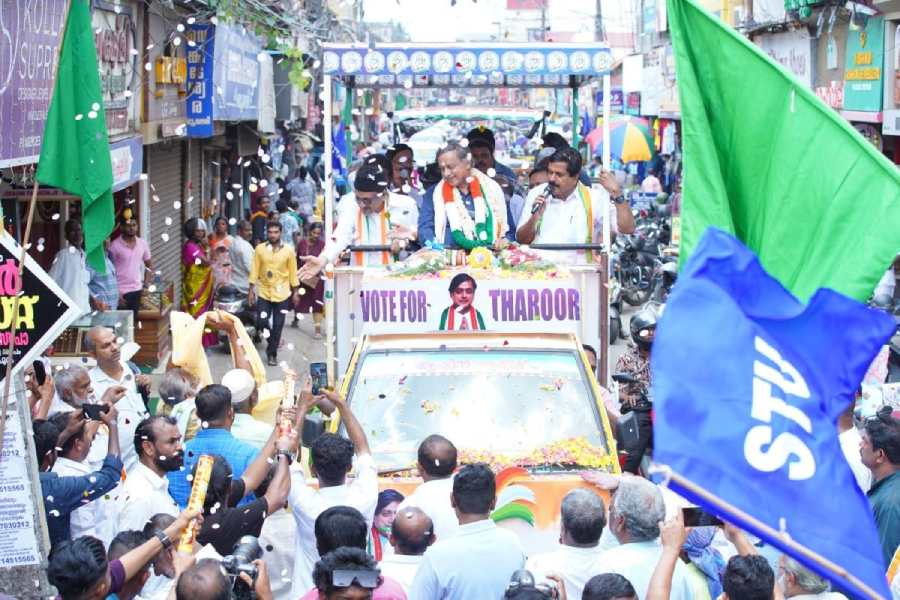A drive around the Kerala capital would give an idea about the intense campaign for Union minister Rajeev Chandrashekar since his posters and banners outnumber those of even Shashi Tharoor in many pockets of the constituency.
But it’s a different question whether publicity material alone can bring votes, that too when minority Christians and Muslims, who form over 30 per cent of the 14.30 lakh voters, have been the deciding factor in the Hindu-majority constituency.
A little over a month into his campaign, Chandrashekar appears to be the main challenger of Tharoor, who is trying his luck for a fourth consecutive term from the constituency. But CPI’s Pannyan Raveendran, who represented the constituency from 2005-2009 until Tharoor made it his own, is no pushover.
As Raveendran told The Telegraph on April 7, he had polled more than 50 per cent votes when he won the constituency. “I had polled 51.2 per cent of votes when I won from here, and the voters know me,” said the native of Kannur in northern Kerala.
Another element of his confidence is the groundwork being done by his own CPI and the CPM. “The Congress and BJP say that I will be pushed to the third position going by the 2019 result,” he said alluding to how his compatriot C. Divakaran finished third.
“But what they don’t talk about is the 2021 Assembly elections that gave LDF six out of seven Assembly constituencies in Thiruvananthapuram Lok Sabha segment. That alone gave us a margin of over a lakh votes, which will reflect in this election,” he said, exuding confidence of a clean victory.
Like Chandrashekar, the CPI candidate too termed Tharoor as an “absentee MP who is never accessible and available for the people”.
But quite like Tharoor, Raveendran’s pitch is also centred around saving the Indian democracy and Constitution by defeating the BJP nationally.
While addressing one of his corner meetings, Tharoor tells a gathering in Balaramapuram, some 20km from Thiruvananthapuram, that the larger mission was “to end the BJP misrule in Delhi”.
Tharoor had defeated BJP’s Kummanam Rajashekaran by nearly one lakh votes in 2019.
“We have embarked on this mission to regain the multiculturalism of India by ending the BJP’s misrule, and bring back the system that treats everyone from every religion, region and linguistic group as one,” Tharoor says in line with the party’s nationwide pitch.
Chandrashekar on the other hand maintains that he would not get his opponents’ narratives, but focus only on developmental issues and his aim to make Thiruvananthapuram a tech hub, skill youngsters and be accessible.
“I just want to solve people’s problems and have no ambition to become a global citizen or be an expert in English literature,” he tells a gathering at Sanskrithi Bhavan of the RSS, taking a swipe at Tharoor.

BJP's Rajeev Chandrashekar on the campaign trail, in a picture shared on Facebook.
But the people are evaluating the candidates and their chances as the polling date fast approaches.
Sharafuddin, a cab driver from Muslim-dominated Beemapally, supports Tharoor although he had voted for the LDF candidate in 2019. “I belong to a family of Congress supporters. Last time I voted for C. Divakaran. But this time I am for Tharoor as I am against hate politics.”
Even a CPM worker who runs a spice shop in East Fort in the city felt it had to be Tharoor for one more time until the Congress finds a suitable alternative in 2026. “I am a CPM worker, but I feel Tharoor deserves another term for all the good work he has done and to prevent the BJP from opening its account in Kerala,” says the man in his forties who declined to be named.
He says people in his neighbourhood have already started advising each other to vote
for Tharoor to stop the BJP from winning.
Kerala votes on April 26










